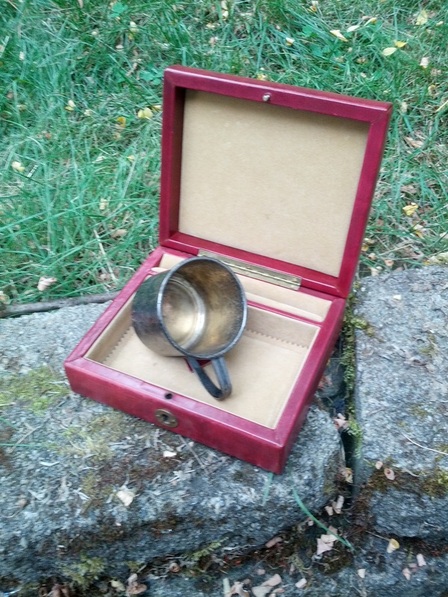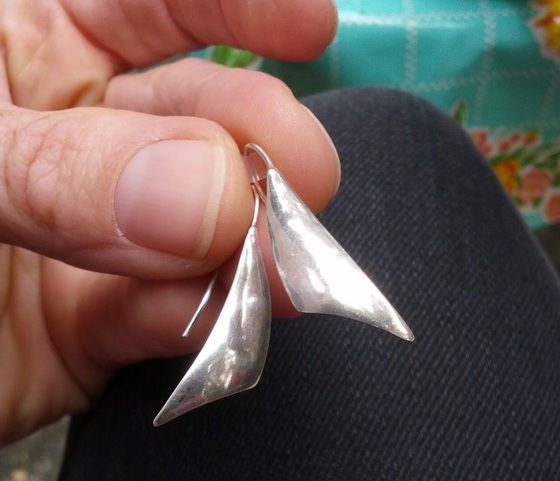A christening cupful of pennies.
Broken and singlet earrings.
Jet beads from the store in Pike Place Market, purchased when I was 11.
These are some of the items stolen from my house the day of my father's memorial service.
Theories abound, but the most popular one is that there is a class of thief who plans ahead, reading obituaries to find out when homes will be empty. My husband thinks they were stupid meth-heads. Whatever they were, they were smart enough to come in through the back door.
For quite a while, I found a way to blame myself. If I hadn't left the laptop in plain sight... of the neighbor's yard. If I had made sure the sliding door was not only locked, but barred... But I've had to let go of the notion of myself as a strong enough power in the universe – not to mention in the home I share with three other people – to cause thieves to target me.
Once I take responsibility for strangers entering my house – well, as soon as I write it down, it looks wrong. A little crazy, a little egocentric, not to mention megalomaniac. I have the personal power to victimize myself?
Yet the bad logic persists, and is only remedied by better logic. People like to remind me that I'm not the only person responsible for checking the doors, not the only one who could have put electronics out of sight. And with all the thought, emotion, and effort that went into Dad's obituary, it would never in a million years have occurred to me not to publicize the memorial. I can't live in defense of things I can't even imagine.
It helped that I recently discovered the sliding door frame has pry marks, and the feeble handle lock (which we never used) broken. There's my good logic: This was not an act of pure opportunity, occasioned by lax locking procedures, but an act planned out well enough that the thief or thieves didn't even notice they could have entered without destruction.
It doesn't help anything at all that I keep discovering losses anew. I didn't notice the coins missing from the christening cup until I had to move a bunch of tchotchkes around this weekend, including the empty leather case, once used to hold movie campaign buttons, a badge from a fair, half a dozen pre-1964 nickels, and a bead from the interchangeable necklace I lost in 1976. Street value: negligible. Personal value: I'm learning to let go.
Letting go was difficult early on. I arrived home from the memorial intending to rest up before rejoining the mourners for dinner and drinks. When we couldn't find the laptop right away, we assumed some person had put it somewhere weird. The search began with mild recriminations and ended with the certainty that someone had entered our home and left with an iPod, a GPS device, and my father's laptop.
I felt like I was being tested: How much can I lose? And how does losing a father's laptop compare to losing a father? How much does the universe need to take away before I attain enlightenment?
Still, every so often I open a container to find it empty of what it is supposed to contain. I have no stud earrings left; they were easy to pour out of their jewelry box and carry away. The good news I don't have to deal with the broken earrings any more, or the mixed legacy of my grandmother's charm bracelet, or toys and mementos whose primary value is endurance. The good news is that my son's bass guitar was walked past and ignored, though it was worth more than the electronics. The good news is that nobody was at home, nobody was hurt, and we didn't lose anything we can't live without.
The good news is that my dad didn't have to hear about it, and worry about me. The good news is that we came together in his name to share our love for him in the way that mattered to us.
And I was wearing the earrings he designed for me to the memorial, so I still have those, and I think about him every time I put them on.
Broken and singlet earrings.
Jet beads from the store in Pike Place Market, purchased when I was 11.
These are some of the items stolen from my house the day of my father's memorial service.
Theories abound, but the most popular one is that there is a class of thief who plans ahead, reading obituaries to find out when homes will be empty. My husband thinks they were stupid meth-heads. Whatever they were, they were smart enough to come in through the back door.
For quite a while, I found a way to blame myself. If I hadn't left the laptop in plain sight... of the neighbor's yard. If I had made sure the sliding door was not only locked, but barred... But I've had to let go of the notion of myself as a strong enough power in the universe – not to mention in the home I share with three other people – to cause thieves to target me.
Once I take responsibility for strangers entering my house – well, as soon as I write it down, it looks wrong. A little crazy, a little egocentric, not to mention megalomaniac. I have the personal power to victimize myself?
Yet the bad logic persists, and is only remedied by better logic. People like to remind me that I'm not the only person responsible for checking the doors, not the only one who could have put electronics out of sight. And with all the thought, emotion, and effort that went into Dad's obituary, it would never in a million years have occurred to me not to publicize the memorial. I can't live in defense of things I can't even imagine.
It helped that I recently discovered the sliding door frame has pry marks, and the feeble handle lock (which we never used) broken. There's my good logic: This was not an act of pure opportunity, occasioned by lax locking procedures, but an act planned out well enough that the thief or thieves didn't even notice they could have entered without destruction.
It doesn't help anything at all that I keep discovering losses anew. I didn't notice the coins missing from the christening cup until I had to move a bunch of tchotchkes around this weekend, including the empty leather case, once used to hold movie campaign buttons, a badge from a fair, half a dozen pre-1964 nickels, and a bead from the interchangeable necklace I lost in 1976. Street value: negligible. Personal value: I'm learning to let go.
Letting go was difficult early on. I arrived home from the memorial intending to rest up before rejoining the mourners for dinner and drinks. When we couldn't find the laptop right away, we assumed some person had put it somewhere weird. The search began with mild recriminations and ended with the certainty that someone had entered our home and left with an iPod, a GPS device, and my father's laptop.
I felt like I was being tested: How much can I lose? And how does losing a father's laptop compare to losing a father? How much does the universe need to take away before I attain enlightenment?
Still, every so often I open a container to find it empty of what it is supposed to contain. I have no stud earrings left; they were easy to pour out of their jewelry box and carry away. The good news I don't have to deal with the broken earrings any more, or the mixed legacy of my grandmother's charm bracelet, or toys and mementos whose primary value is endurance. The good news is that my son's bass guitar was walked past and ignored, though it was worth more than the electronics. The good news is that nobody was at home, nobody was hurt, and we didn't lose anything we can't live without.
The good news is that my dad didn't have to hear about it, and worry about me. The good news is that we came together in his name to share our love for him in the way that mattered to us.
And I was wearing the earrings he designed for me to the memorial, so I still have those, and I think about him every time I put them on.


 RSS Feed
RSS Feed